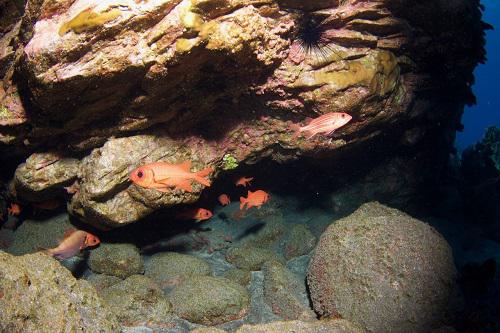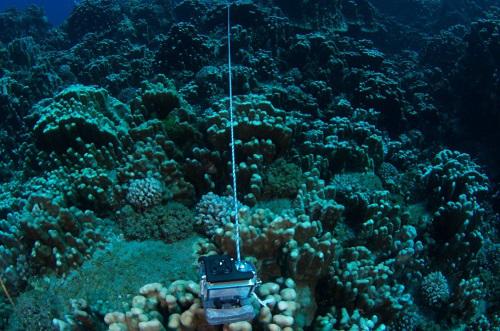María Consuelo Guevara
The COVID-19 pandemic has created a massive "natural experiment" at scuba diving destinations worldwide by terminating dive tourism. By re-visiting our previously sampled Rapa Nui sites immediately after the COVID-19 quarantine ends, we propose to examine effects of the cessation of diver disturbance on fish populations, their behavior, and ecological effects.
We hypothesize that fish that are easily spooked by divers will increase in abundance, particularly at formerly high diver visitation sites, resulting in greater herbivory and/or predation on subtidal communities. This project provides an unparalleled opportunity to learn how human activity affects MCPA's by studying what happens when it's absent.

Captured from the deployed cameras, wherein this case we can see Mārau fish- Myripristis tiki (Greenfield, 1974), one of the eye-catching fish for divers in Rapa Nui, which inhabi
The project will be conducted in Rapa Nui (Easter Island) (29º 09’ S; 109º 23’ W), a Polynesian island of the Chilean territory located in the Eastern Indo-Pacific, recognized for a high species endemism (Osorio 2018) and for being one of the world´s largest Marine and Coastal Protected Areas (MCPA´S). A team member will travel to Rapa Nui for surveying 4 sites of the island, categorized representing a gradient of diver disturbance and studied previously in time (pre-COVID) considering that during the current COVID - 19 pandemic, the number of divers visiting sites and their associated impacts on the behavior and abundance of marine organisms (diver disturbance) has decreased precipitously.

The GoPro camera deployed for the analysis of fish communities. © Alejandro Pérez-Matus
Rapa Nui Islands is one of the most popular dive destinations in the world, where dive tourism ended on March 16, 2020 when the Chilean Government stopped it. In the pre-COVID period, 150.000 tourists visit annually the island, being mainly advance and beginner’s scuba divers. The presence of divers alters fish behavior (Rhoades et al. 2018) and abundance, scaring away some species (Emslie et al. 2018) with important ecological ramifications (Rhoades et al. 2019). Consequently, we predict that by removing diver disturbance, the COVID pandemic is changing the ecology of reef fish communities, food webs and ecosystem functioning in the Rapa Nui.